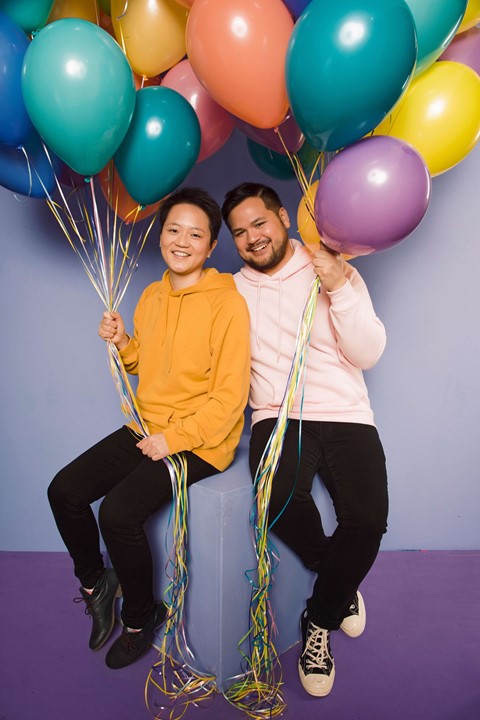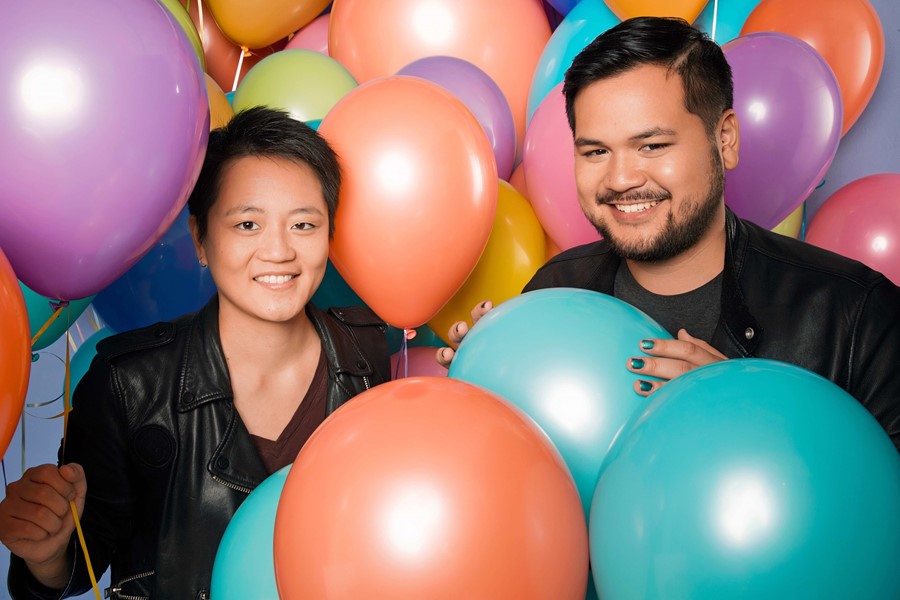Thomas Curry meets Tobin Low and Kathy Tu, co-hosts of WNYC’s critically acclaimed Nancy which, after three years and more than 100 episodes, will release its final episode next month
When Tobin Low and Kathy Tu, co-hosts of WNYC’s critically acclaimed Nancy, first met they were each in the midst of a career crisis. “I was going to throw out my old life and try to do this radio thing – it felt like the highest stakes thing,” remembers Low. Despondent about his work as a classical cellist in New York, Low was desperate for something new; and Tu, approaching the end of her masters, suddenly realised that law was the last thing she wanted to practise. “Ugh it sounds so woo-woo now,” recalls Tu, “but I’d been going to these conferences on ‘how to turn your passion into your job!’ I was very inspired by that.”
Now on its final season after more than 100 episodes, the show they would go on to create has been named one of TIME magazine’s best podcasts of the year, described by the Guardian as “warm and inspiring”, by Out magazine as a “must-listen” and by Entertainment Weekly as “a rich, 360-degree look at what it means to be queer”. But before all that, both hosts were stuck in a rut, unsure of what to do next.
Voracious listeners of This American Life and Radiolab, the pair separately stumbled across a small audio programme hosted twice a year in Cape Cod – the Transom Story Workshop. With alumni at Spotify, the New York Times and the Washington Post among others, acceptance into the programme felt like a make-or-break moment for the two would-be producers. “I freaked the hell out when I found out I got in,” remembers Low. “Transom felt like the lifeline to switch careers, but it was hard for a lot of people around me to get what it meant. They all knew me as a cellist, that’s what I’d been trying to do, so when I told them ‘I got into this radio programme!’ They were excited for me, but I don’t think anyone actually knew what was happening.” “It was a lot of ‘Yay! … What is it?’” Tu agrees. “At the time, people were like ‘What’s a podcast?’”
Far from an idyllic, sun-drenched retreat, Transom’s autumn intake during the Cape’s low season was cold, grey and isolated. Grand, seafront houses had been left empty, shut up for winter. “Homes were abandoned,” says Low. “Mostly you were there with scientists at the research facilities.” The atmosphere was intense. “Everybody was in such a moment of transition. It felt like group therapy every week, we poured ourselves into these stories,” says Tu. “Everyone has lit their lives on fire to restart in this really big way,” agrees Low. “You’re there, you have a limited amount of time to learn this new skill and you have all this ambition coming out.” Working exhausting long days, the weight of their future careers in the balance, the two bonded while producing intimate character studies, short documentaries, vox pops, radio promos and sonic IDs. “We spent a lot of time together listening to each other’s stories and really being supportive,” says Tu. “Kathy and I both turned in these similarly experimental pieces,” remembers Low, “and there was a kinship in what we were both trying to do with radio and how we thought about it.”
After the programme ended the two returned to their respective coasts to begin developing their fledgling careers. Tu began mixing shows, juggling behind-the-scenes production for a bunch of different podcasts. Low joined Marketplace, a business show from American Public Media, working as an overnight assistant on the website. “I assumed that once we went home, maybe we wouldn’t have this connection anymore, but it kept going. It deepened,” remembers Tu. “I think we were the only people in our class who really believed in G-chat,” jokes Low. “We were online, for hours at a time.”
Around the same time that Low and Tu’s friendship was solidifying into something more permanent, Sarah Koenig and Julie Snyder debuted Serial. The podcast spread around the world like audio wildfire, reaching 10 million downloads in less than two months. Simultaneously, Roman Mars, creator of 99% Invisible, had just raised $600,000 on Kickstarter to fund a new collective of creatively minded podcasts. “There was this feeling that people we knew, who were reporters and producers on other shows, were making their own stuff and taking ownership,” remembers Low. “I thought, we should do that! We should figure out something to make together.” “I was just like, ‘sure’,” says Tu. “‘Whatever, whatever you want to do. My role is in the background, I’ll be supportive.’” When WNYC – makers of Death, Sex & Money, Dolly Parton’s America and The New Yorker Radio Hour – announced a call for rookie producers to join their Podcast Accelerator contest, Low and Tu used the application as a deadline to finally get their ideas down on paper. “I remember so specifically that we got our application in on the last day that it was due,” remembers Tu. “We were like OK cool! It’s done!”

Selected from more than 400 applicants, the pair made it through to the finals and were flown to LA for an in-person pitch. “It really was like a Pop Idol audition show; we had five minutes on stage,” remembers Low. Rather than leaning in on a single story, Low and Tu gathered as much good tape as they could find. Fragments, clips, snippets of their own experiences as queer people, anything that would give the judges a sense of how far-reaching their potential podcast could be. Having originally intended to stay firmly behind-the-scenes, a recording of Tu coming out to her mother particularly caught the judge’s attention. “Sometimes I have a feeling in life when things are meant to be, and when they’re not,” remembers Low. “Once we were picked as a finalist, I thought, we’re going to get this.” In September 2015, roughly a year after Serial launched, Low and Tu were given the chance to formally make their first pilot. On April 9, 2017 Nancy debuted its first episode.
A podcast about how we define ourselves, and the journey it takes to get there, Nancy combines nuance, heart and humour in a delicious cocktail of queer storytelling. Featuring interviews with well-known names, including Samira Wiley, Bowen Yang, Desiree Akhavan and Lena Waithe among others, the podcast shines brightest when providing a space for ordinary people to tell personal stories about how they’re navigating the complexities of sexuality and identity. Some of the show’s most powerful episodes catalogue Low and Tu’s own experiences – Tu’s overcoming her fear of looking butch and deciding to cut her hair short, or Low’s reckoning with a lifetime spent forcibly deepening his voice. “Those personal stories are the hardest, because you inevitably just feel like ‘man, I’m just talking about myself a bunch,’” says Low. “You literally have no perspective on them until you put them out.” Throughout each episode, the series always strives for empathy, but the vulnerability of these personal stories is particularly affecting.
The transition from junior producers to hosts and creators of their own show wasn’t always easy, particularly in Nancy’s early years. “It was so busy,” remembers Tu. “If we didn’t work on the weekend, I felt guilty.” “It was this delirious time in our lives,” agrees Low. “There was at least one episode that first season where I spent the whole night at the office and only turned it in at 5am. Then I just rolled straight into the next work day.” At one point, when it looked like Facebook Live might be podcasting’s next big platform, in addition to the team’s planned schedule of highly produced mini-documentaries, the duo had to put out an hour-long weekly live show as well. During a livestream on Golden Girls, one listener sent them an enormous cheesecake in an attempt to lift morale. “This cake was clearly meant for four or five people,” says Low. “We cut it in half, we each took a half, and Kathy in a delirium finished her half during this one hour time slot.” “Not to toot my own horn here,” Tu adds, “but I was also answering Golden Girls trivia at the same time.”
Now, three years on and more than 100 episodes later, Nancy will release its final episode on June 29. It’s a sad and surprising end to one of the most thoughtfully made queer podcasts, and a genuine loss for the LGBTQ+ community. On Friday May 22, Low and Tu issued an emotional farewell: “We are so proud of the work we did on this show,” they wrote. “The stories that we’ve gotten to share with you over the last three years have meant the world to us. And above all else, the love you have shown us has been unbelievable. Thank you to all of the amazing people who contributed to the sound and spirit of Nancy.” Tu and Low will join WNYC’s Radiolab, bringing their radio journey full circle.
When asked to reflect on Nancy’s mission, and what legacy the two hosts hope the show will leave, their answer is simple – to foster empathy among listeners, and to help queer people feel more connected to their history, culture and community. “We’re always hoping that our non-queer listeners get the chance to inhabit somebody else’s experience and walk away feeling more open and understanding,” says Low. “I hope that queer listeners hear something that they can relate to very authentically. That they recognise a moment or a thought that feels true and that in turn makes them feel less alone.” He continues: “At the end of the day, we’re always hoping that we’re telling really fucking good stories. That we’re not just discussing a topic, but that we’re truly getting to know one person or a small group of people’s experience, and that we’re not asking that experience to speak for a whole swath of people.” “Nancy has been the single most amazing thing I have ever worked on,” says Tu. “It’s brought me so much more than I could ever list. I am so, so grateful for it all.”
Nancy’s final episode will be released on June 29, 2020.
